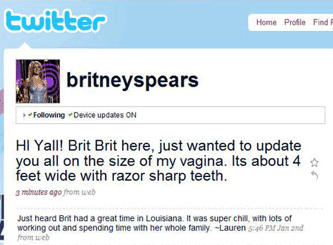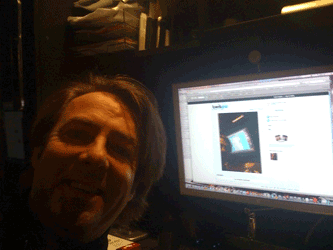'Nofollow' and Twitter's crisis of trust
A couple of weeks back, @onpause and I were discussing on Twitter whether URL-shortening had any impact on the value that Twitter links passed on through to Google. I was pointing out that, sadly, Twitter is one of those places where the use of rel="nofollow" on all outbound links has rendered it virtually worthless for search engine purposes. I got halfway through writing a blog post about why this was a shame, when suddenly Twitter seems to have become consumed by a three-pronged attack around issues of 'trust'.
Celebrity hacks
Britney Spears had her celebrity account hacked.

At this distance it isn't clear whether that was because there was someone disgruntled who used to be on her team, whether the account faced a brute force attack on the login, or whether someone just chose a really crap password.
Alternatively, it could be that Britney's team had been phished or used one of the numerous third party services that require you to hand over your username and password in return for some sort of analysis of Twitter behaviour. Thanks to the way the Twitter API is constructed, password security for third party apps is a major issue that many people have with the service.
Celebrity imposters
Jonathan Ross - who I was under the impression had officially changed his name to "Disgraced BBC presenter Jonathon Ross" - is on Twitter as @wossy.

He is proving a willing and invaluable tool for flushing out British celebrity imposters on Twitter. As soon as a Jeremy Clarkson, Jack Dee or Eddie Izzard appears on the service, @wossy has been getting in touch with them using his massive celebrity telephone directory to verify their provenance.
Twitter's role in the Middle East Cyberwar
The cyberwar aspect of the struggle between Israelis and Palestinians on the web has also started to play out on Twitter. Events like the terrorist attacks in Mumbai or the riots across Greece have shown how hashtags could be used to allow people to track breaking news using Twitter.

Picture thanks to Teacher Dude.
At the beginning of this latest round of Middle Eastern conflict, people began using #gaza to tag tweets about the flare-up. However, someone has stepped in to render this useless. Essentially a bot is taking random tweets and inserting the #gaza hashtag into them, making searching for and following genuine tweets about Gaza virtually impossible for a while. Tom Phillips has a great post looking at this issue in Metro's 'The Ridculant' blog.
No alternative but to "nofollow"
Not all links are created equal these days, thanks to rel=nofollow, introduced by Google in 2005. This was adopted by Twitter for all outbound links in Twitter streams in 2007. Now, after some alleged nudging from Matt Cutts at Google, even your own site URL on your Twitter profile is marked as an untrusted link in this way. It means that Google and the other major search players give no value to a link appearing on Twitter.
Of course, Twitter are free to run their business how they see fit. All of the examples above show why they are almost certainly right to provide a disincentive to spammers on the service with the nofollow 'link condom'.
The shame here is that, were it not for all of this abuse, genuine links shared on Twitter should be amongst the most valuable and trusted on the web for search engine.
After all, your every time you tweet on Twitter you do so trusting that it will be interesting for your followers. And they are following you because they trust that they will get some value from your twitterings. So, if I say "hey, look at link x", that ought to be a signifier to search engines that link x is a valuable and interesting bit of web content.
As it is, Twitter is just another corner of the web where, thanks to spammy and nefarious activities in some quarters, none of us get any search engine benefit from popular links on Twitter - including the search engines themselves.
Good post, and I agree, it's a big pain in the @$$ that Twitter uses nofollow. Especially since someone could really build up a strong and legitimate userbase using the app.
It is a shame that Twitter uses nofollow...with it's popularity causing widespread usage the SEO benefits are lost.
Re: Twitter nofollows - a simple solution would be to only have nofollow on accounts less than 3 months old, or with fewer than say 10 or 20 followers, or with a vastly huge followed/follow ration - all of which are indicative of spambots - and allow the rest. I wonder if anyone has suggested that
There should be different levels of membership so somebody who has over x number of followers can become dofollow - I don't see how spammers could game that...
I never liked this "linkback" premise to begin with. It carries way too much weight when it comes to search engine ranking. Just because someone links to your site, doesn't mean it's better than one that has less links. It doesn't mean anything.
What are the biggest factors? If I had 10 random websites that were all getting 500 visitors a day, there are two factors that tell me which one is best. 1. Average time spent on the site. 2. Return visits to the site. People return to good sites and spend a lot of time on them. That tells me they're good.